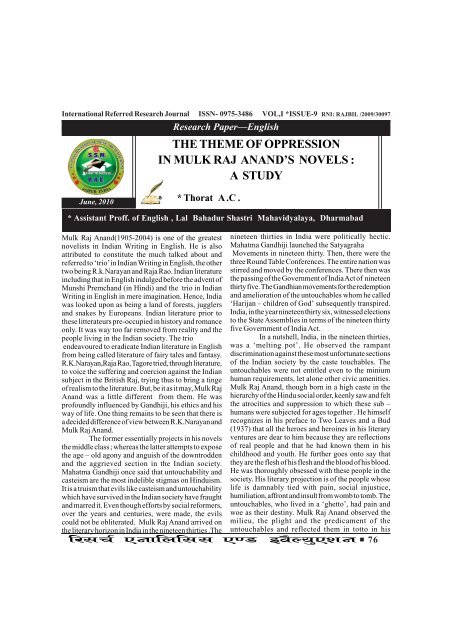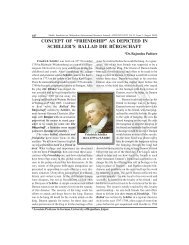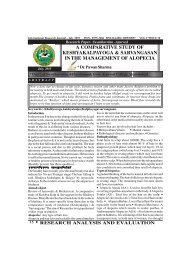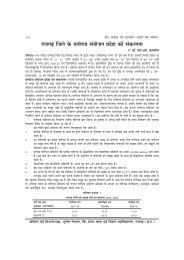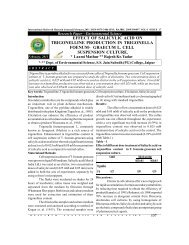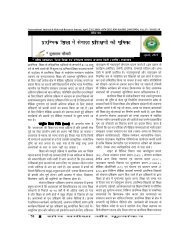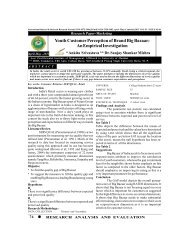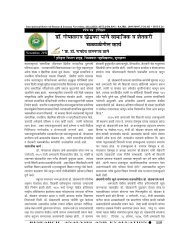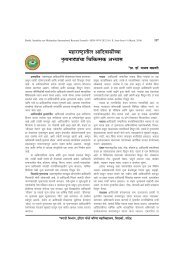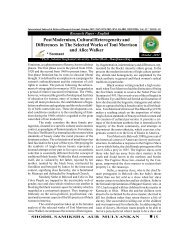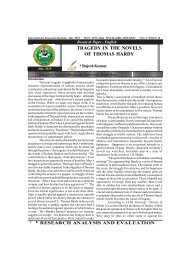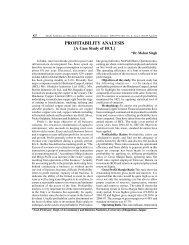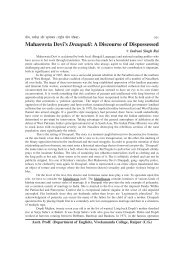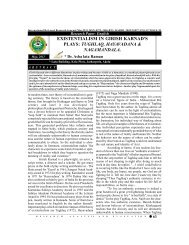the theme of oppression in mulk raj anand's novels - international ...
the theme of oppression in mulk raj anand's novels - international ...
the theme of oppression in mulk raj anand's novels - international ...
Create successful ePaper yourself
Turn your PDF publications into a flip-book with our unique Google optimized e-Paper software.
International Referred Research Journal ISSN- 0975-3486 VOL,I *ISSUE-9 RNI: RAJBIL /2009/30097<br />
Research Paper—English<br />
THE THEME OF OPPRESSION<br />
IN MULK RAJ ANAND’S NOVELS :<br />
A STUDY<br />
June, 2010<br />
* Thorat A .C .<br />
* Assistant Pr<strong>of</strong>f. <strong>of</strong> English , Lal Bahadur Shastri Mahavidyalaya, Dharmabad<br />
Mulk Raj Anand(1905-2004) is one <strong>of</strong> <strong>the</strong> greatest n<strong>in</strong>eteen thirties <strong>in</strong> India were politically hectic.<br />
novelists <strong>in</strong> Indian Writ<strong>in</strong>g <strong>in</strong> English. He is also Mahatma Gandhiji launched <strong>the</strong> Satyagraha<br />
attributed to constitute <strong>the</strong> much talked about and Movements <strong>in</strong> n<strong>in</strong>eteen thirty. Then, <strong>the</strong>re were <strong>the</strong><br />
referred to ‘trio’ <strong>in</strong> Indian Writ<strong>in</strong>g <strong>in</strong> English, <strong>the</strong> o<strong>the</strong>r three Round Table Conferences. The entire nation was<br />
two be<strong>in</strong>g R.k.Narayan and Raja Rao. Indian literature stirred and moved by <strong>the</strong> conferences. There <strong>the</strong>n was<br />
<strong>in</strong>clud<strong>in</strong>g that <strong>in</strong> English <strong>in</strong>dulged before <strong>the</strong> advent <strong>of</strong> <strong>the</strong> pass<strong>in</strong>g <strong>of</strong> <strong>the</strong> Government <strong>of</strong> India Act <strong>of</strong> n<strong>in</strong>eteen<br />
Munshi Premchand (<strong>in</strong> H<strong>in</strong>di) and <strong>the</strong> trio <strong>in</strong> Indian thirty five. The Gandhian movements for <strong>the</strong> redemption<br />
Writ<strong>in</strong>g <strong>in</strong> English <strong>in</strong> mere imag<strong>in</strong>ation. Hence, India and amelioration <strong>of</strong> <strong>the</strong> untouchables whom he called<br />
was looked upon as be<strong>in</strong>g a land <strong>of</strong> forests, jugglers ‘Harijan – children <strong>of</strong> God’ subsequently transpired.<br />
and snakes by Europeans. Indian literature prior to India, <strong>in</strong> <strong>the</strong> year n<strong>in</strong>eteen thirty six, witnessed elections<br />
<strong>the</strong>se litterateurs pre-occupied <strong>in</strong> history and romance to <strong>the</strong> State Assemblies <strong>in</strong> terms <strong>of</strong> <strong>the</strong> n<strong>in</strong>eteen thirty<br />
only. It was way too far removed from reality and <strong>the</strong> five Government <strong>of</strong> India Act.<br />
people liv<strong>in</strong>g <strong>in</strong> <strong>the</strong> Indian society. The trio<br />
In a nutshell, India, <strong>in</strong> <strong>the</strong> n<strong>in</strong>eteen thirties,<br />
endeavoured to eradicate Indian literature <strong>in</strong> English was a ‘melt<strong>in</strong>g pot’. He observed <strong>the</strong> rampant<br />
from be<strong>in</strong>g called literature <strong>of</strong> fairy tales and fantasy. discrim<strong>in</strong>ation aga<strong>in</strong>st <strong>the</strong>se most unfortunate sections<br />
R.K.Narayan,Raja Rao, Tagore tried, through literature, <strong>of</strong> <strong>the</strong> Indian society by <strong>the</strong> caste touchables. The<br />
to voice <strong>the</strong> suffer<strong>in</strong>g and coercion aga<strong>in</strong>st <strong>the</strong> Indian untouchables were not entitled even to <strong>the</strong> m<strong>in</strong>ium<br />
subject <strong>in</strong> <strong>the</strong> British Raj, try<strong>in</strong>g thus to br<strong>in</strong>g a t<strong>in</strong>ge human requirements, let alone o<strong>the</strong>r civic amenities.<br />
<strong>of</strong> realism to <strong>the</strong> literature. But, be it as it may, Mulk Raj Mulk Raj Anand, though born <strong>in</strong> a high caste <strong>in</strong> <strong>the</strong><br />
Anand was a little different from <strong>the</strong>m. He was hierarchy <strong>of</strong> <strong>the</strong> H<strong>in</strong>du social order, keenly saw and felt<br />
pr<strong>of</strong>oundly <strong>in</strong>fluenced by Gandhiji, his ethics and his <strong>the</strong> atrocities and suppression to which <strong>the</strong>se sub –<br />
way <strong>of</strong> life. One th<strong>in</strong>g rema<strong>in</strong>s to be seen that <strong>the</strong>re is humans were subjected for ages toge<strong>the</strong>r . He himself<br />
a decided difference <strong>of</strong> view between R.K.Narayan and recognizes <strong>in</strong> his preface to Two Leaves and a Bud<br />
Mulk Raj Anand.<br />
(1937) that all <strong>the</strong> heroes and hero<strong>in</strong>es <strong>in</strong> his literary<br />
The former essentially projects <strong>in</strong> his <strong>novels</strong> ventures are dear to him because <strong>the</strong>y are reflections<br />
<strong>the</strong> middle class ; whereas <strong>the</strong> latter attempts to expose <strong>of</strong> real people and that he had known <strong>the</strong>m <strong>in</strong> his<br />
<strong>the</strong> age – old agony and anguish <strong>of</strong> <strong>the</strong> downtrodden childhood and youth. He fur<strong>the</strong>r goes onto say that<br />
and <strong>the</strong> aggrieved section <strong>in</strong> <strong>the</strong> Indian society. <strong>the</strong>y are <strong>the</strong> flesh <strong>of</strong> his flesh and <strong>the</strong> blood <strong>of</strong> his blood.<br />
Mahatma Gandhiji once said that untouchability and He was thoroughly obsessed with <strong>the</strong>se people <strong>in</strong> <strong>the</strong><br />
casteism are <strong>the</strong> most <strong>in</strong>delible stigmas on H<strong>in</strong>duism. society. His literary projection is <strong>of</strong> <strong>the</strong> people whose<br />
It is a truism that evils like casteism and untouchability life is damnably tied with pa<strong>in</strong>, social <strong>in</strong>justice,<br />
which have survived <strong>in</strong> <strong>the</strong> Indian society have fraught humiliation, affront and <strong>in</strong>sult from womb to tomb. The<br />
and marred it. Even though efforts by social reformers, untouchables, who lived <strong>in</strong> a ‘ghetto’, had pa<strong>in</strong> and<br />
over <strong>the</strong> years and centuries, were made, <strong>the</strong> evils woe as <strong>the</strong>ir dest<strong>in</strong>y. Mulk Raj Anand observed <strong>the</strong><br />
could not be obliterated. Mulk Raj Anand arrived on milieu, <strong>the</strong> plight and <strong>the</strong> predicament <strong>of</strong> <strong>the</strong><br />
<strong>the</strong> literary horizon <strong>in</strong> India <strong>in</strong> <strong>the</strong> n<strong>in</strong>eteen thirties .The untouchables and reflected <strong>the</strong>m <strong>in</strong> totto <strong>in</strong> his<br />
fjlpZ ,ukfyfll ,.M boSY;q,’ku 76
International Referred Research Journal ISSN- 0975-3486 VOL,I *ISSUE-9 RNI: RAJBIL /2009/30097<br />
novelistic adventures. However, it has to be conceded <strong>the</strong>re. Ultimately, <strong>the</strong> village priest does <strong>the</strong> needful<br />
with remorse that this ana<strong>the</strong>ma <strong>of</strong> casteism and and asks her to come to his house for clean<strong>in</strong>g . But,<br />
untouchability has not obliterated to <strong>the</strong> fullest. The see<strong>in</strong>g nobody around, when she goes to his house,<br />
present paper endeavours to <strong>the</strong>matically study he tries to molest her. The priest tries to fish <strong>in</strong> <strong>the</strong><br />
Untouchable (1935), Coolie (1936) and The Road troubled waters. The crueler th<strong>in</strong>k is when people ga<strong>the</strong>r,<br />
(1961)with regard to <strong>the</strong> suppression aga<strong>in</strong>st <strong>the</strong> <strong>the</strong> priest impenitently <strong>in</strong>dicts <strong>the</strong> <strong>in</strong>nocent girl that<br />
untouchables and <strong>the</strong> marg<strong>in</strong>alized <strong>in</strong> <strong>the</strong> Indian society she has defiled his religion. If we view <strong>the</strong> <strong>in</strong>cident from<br />
by <strong>the</strong> so- called upper caste touchables even <strong>in</strong> today’s a humanitarian perspective, we must say that might is<br />
context.<br />
right. The untouchables, be<strong>in</strong>g weak, have no justice.<br />
Untouchable, Mulk Raj Anand’s debut novel and The priest is supposed to preach <strong>the</strong> gospel <strong>of</strong> truth,<br />
magnum opus, is a unique novel. It, <strong>in</strong> <strong>the</strong> Joycean humanity and morality. But, he turns out to be a<br />
‘stream <strong>of</strong> consciousness’ technique, describes <strong>the</strong> victimizer, a tyrant. On many occasions, Bakha and his<br />
events <strong>in</strong> a s<strong>in</strong>gle day <strong>in</strong> <strong>the</strong> life <strong>of</strong> Bakha, <strong>the</strong> protagonist family are subjected to humiliatory treatment. The<br />
<strong>in</strong> <strong>the</strong> novel, <strong>in</strong> <strong>the</strong> town <strong>of</strong> Balushah. Bakha, an ‘Bazar-Incident’ is also equally conv<strong>in</strong>c<strong>in</strong>g and<br />
untouchable boy, is a victim <strong>of</strong> <strong>the</strong> caste –ridden society. touch<strong>in</strong>g. Bakha has to undergo every <strong>in</strong>sult that comes<br />
He belongs to <strong>the</strong> sweeper community. He has a hefty <strong>in</strong> his stride. His only crime is that he casually and<br />
physique and muscles -”Each muscle <strong>of</strong> body, had as naively touches a caste H<strong>in</strong>du <strong>in</strong> <strong>the</strong> market. For it, he<br />
a rock when it came to play, seemed to sh<strong>in</strong>e forth like is ill-treated <strong>in</strong> <strong>the</strong> words –‘sw<strong>in</strong>e dog’ , ‘dirty dog’,<br />
glass. What a dexterous workman! The on looker would ‘you brute’. Bakha is unable to retaliate and has to<br />
have said. And though his job was dirty, he rema<strong>in</strong>ed listen and bend down his head, mumbl<strong>in</strong>g someth<strong>in</strong>g.<br />
comparatively clean”. But, he is reluctant to perform We commiserate with Bakha when <strong>the</strong> man says-”This<br />
what he is supposed and compelled to.He has to clean dirty dog bumped right <strong>in</strong>to me”. Likewise, <strong>the</strong> ‘Templetoilets<br />
and br<strong>in</strong>g about sanitation at <strong>the</strong> cost <strong>of</strong> his own Incident’ is also equally mov<strong>in</strong>g and begets our<br />
hygiene. Every now and <strong>the</strong>n he is disparaged and sympathy for <strong>the</strong> sufferer. Bakha is a type and an<br />
called “defiled and polluted “. He is only a beast <strong>of</strong> <strong>in</strong>dividual as well. He is characteristic <strong>of</strong> <strong>the</strong> repressed,<br />
burden <strong>in</strong> <strong>the</strong> eyes <strong>of</strong> <strong>the</strong> highly prejudiced society. His depressed and underprivileged class. He is one <strong>of</strong><br />
sister, too, has to dance attendance to <strong>the</strong> houses <strong>of</strong> many unlucky ones whose fate is pa<strong>in</strong> and is dest<strong>in</strong>ed<br />
<strong>the</strong> touchables for chores and return humiliated. In to undergo affronts, humiliation and mortification by<br />
utter desperation and exasperation, he tells his fa<strong>the</strong>r- <strong>the</strong> touchables . These untouchable people f<strong>in</strong>d<br />
”They th<strong>in</strong>k we are mere dirt because we clean <strong>the</strong>ir <strong>the</strong>mselves out <strong>of</strong> place, out <strong>of</strong> society and rema<strong>in</strong><br />
dirt”. The society is not at all considerate to him even damnable somewhere or o<strong>the</strong>r even today.<br />
if he <strong>of</strong>fers a help<strong>in</strong>g hand to it. On an occasion, Bakha Coolie is <strong>the</strong> second novel which Mulk Raj Anand<br />
is play<strong>in</strong>g hockey. A little boy is <strong>in</strong>jured and as Bakha penned <strong>in</strong> n<strong>in</strong>eteen thirty six. It is a sequel to<br />
lifts <strong>the</strong> boy up, his <strong>in</strong>dignant mo<strong>the</strong>r screams -” Untouchable . Coolie is acclaimed to be a folk epic <strong>of</strong><br />
Polluted, polluted<br />
modern India. The protagonist <strong>in</strong> <strong>the</strong> novel, like Bakha,<br />
“.He is utterly despaired. He envisages a ray <strong>of</strong> hope is an untouchable boy, Munoo. Coolie is a<br />
when Mahatma Gandhiji visits <strong>the</strong> place and calls upon contemptuous word <strong>in</strong> India, like <strong>the</strong> word untouchable.<br />
people to regard <strong>the</strong> untouchables as ‘Harijan- man <strong>of</strong> It mars human dignity. The novel is ramified <strong>in</strong>to five<br />
God ‘. The Mahatma also exhorts people not to observe chapters. It is an exhaustive saga which details on how<br />
<strong>the</strong> social evils <strong>in</strong> <strong>the</strong>ir lives. There are many occasions Munoo, right from his childhood, is entangled <strong>in</strong>to<br />
<strong>in</strong> <strong>the</strong> novel which reveal <strong>the</strong> stark and naked realities hardships unless he precipitates and eventually<br />
<strong>in</strong> <strong>the</strong> society. One such occasion is when <strong>the</strong> succumbs to consumption. Munoo is an orphan boy<br />
untouchables are victimized, ravished and <strong>the</strong>ir morale liv<strong>in</strong>g with his unlov<strong>in</strong>g and uncar<strong>in</strong>g uncle and aunt.<br />
shattered <strong>in</strong>to pieces. The’ Well Incident ‘ <strong>in</strong> <strong>the</strong> novel He is made to be a page to dance attendance to his<br />
poignantly describes how <strong>the</strong>se ill – fated people are employer Baboo Nathoo Ram. At <strong>the</strong> very outset, he is<br />
usurped by <strong>the</strong> so-called high class touchables. Bakha’s admonished –”You are <strong>the</strong>ir servant and <strong>the</strong>y are big<br />
sister once goes to <strong>the</strong> village well for fetch<strong>in</strong>g water. people”. He is reproached for br<strong>in</strong>g<strong>in</strong>g <strong>in</strong> rustic<br />
She waits to be given a little water from <strong>the</strong> well, as she manners. Be<strong>in</strong>g denied <strong>the</strong> flush<strong>in</strong>g lavatory, he relieves<br />
is not allowed, be<strong>in</strong>g untouchable, to touch anyth<strong>in</strong>g <strong>in</strong> open for which he is highly repentant. He leaves <strong>the</strong><br />
77<br />
RESEARCH ANALYSIS AND EVALUATION
International Referred Research Journal ISSN- 0975-3486 VOL,I *ISSUE-9 RNI: RAJBIL /2009/30097<br />
house and jo<strong>in</strong>s a pickle factory at Daulatapur. He is a differences, someth<strong>in</strong>g <strong>of</strong> all this is vigorously<br />
little relieved here, when he says- “ I want to live , I want portrayed by Anand”.<br />
to know , I want to work, to work this mach<strong>in</strong>e”. But, Munoo’s exploitation is symbolically <strong>the</strong><br />
unfortunately, his benefactor becomes bankrupt. He, exploitation <strong>of</strong> <strong>the</strong> poor. Munoo’s predicament is<br />
eventually, becomes a coolie <strong>in</strong> <strong>the</strong> market yard and a characteristically that <strong>of</strong> <strong>the</strong> proletariats. In <strong>the</strong> fond<br />
porter at <strong>the</strong> station. There is a sharp sense <strong>of</strong> pathos hope <strong>of</strong> survival, he moves from village to town, from<br />
<strong>in</strong> <strong>the</strong> l<strong>in</strong>es below, <strong>in</strong>dicat<strong>in</strong>g <strong>the</strong> mental thraldom <strong>of</strong> <strong>the</strong> town to city, from city to Bombay and f<strong>in</strong>ally from<br />
menials :<br />
Bombay to Shimla. At <strong>the</strong> same time, he comes across<br />
“ The bodies <strong>of</strong> numberless coolies lay strewn a score <strong>of</strong> people. The action <strong>of</strong> <strong>in</strong>ternalization and<br />
<strong>in</strong> tattered garbs. Someone curled up <strong>in</strong> knots, o<strong>the</strong>rs <strong>in</strong>doctr<strong>in</strong>ation takes place <strong>in</strong> <strong>the</strong> case <strong>of</strong> Munoo. It is<br />
lay faced downwards on folded arms, o<strong>the</strong>rs were flat <strong>the</strong> given self <strong>of</strong> Munoo which overpowers his <strong>in</strong>ner<br />
on <strong>the</strong>ir chests, pillow<strong>in</strong>g <strong>the</strong>ir heads on <strong>the</strong>ir bundles and <strong>in</strong>nate self. It is not his consciousness that<br />
or boxes, o<strong>the</strong>rs crouched <strong>in</strong>to corners talk<strong>in</strong>g, o<strong>the</strong>rs determ<strong>in</strong>es <strong>the</strong> course <strong>of</strong> his action. Ra<strong>the</strong>r, it is <strong>the</strong><br />
still huddled toge<strong>the</strong>r at <strong>the</strong> doors steps, or lay on <strong>the</strong> social reality that gives effect to and moulds his<br />
boards <strong>in</strong> a sleep which looked like death, but that it was consciousness. He eventually turns out to be a creature<br />
broken by deep sights”.<br />
<strong>of</strong> circumstance.<br />
Munoo’s life gradually becomes episodic. He Mulk Raj Anand’s The Road , written <strong>in</strong> 1961,<br />
jo<strong>in</strong>s a depraved Yogi for sometime to earn his livelihood. also deals with <strong>the</strong> <strong>the</strong>me <strong>of</strong> untouchability. Bhikhu,<br />
He encounters an elephant tra<strong>in</strong>er <strong>in</strong> a circus. With <strong>the</strong> <strong>the</strong> protagonist <strong>in</strong> <strong>the</strong> novel, is a revelation <strong>of</strong> Bakha <strong>of</strong><br />
help <strong>of</strong> <strong>the</strong> elephant tra<strong>in</strong>er, he reaches Bombay. Untouchable. Bhikhu is a road worker, thus help<strong>in</strong>g<br />
However, he gets coiled <strong>in</strong> hardships everywhere. He sort out <strong>the</strong> difficulty <strong>of</strong> transportation. The work <strong>in</strong><br />
turns out to be an object <strong>of</strong> perennial exploitation. That progress is done under <strong>the</strong> patronage <strong>of</strong> Dhooli S<strong>in</strong>gh,<br />
is why, he is given a warn<strong>in</strong>g –”The bigger a city is, <strong>the</strong> a caste H<strong>in</strong>du from <strong>the</strong> Govardhan village. He shows<br />
more cruel it is to <strong>the</strong> sons <strong>of</strong> Adam”. An <strong>in</strong>nocent lad sympathy for <strong>the</strong> untouchables. The landlord is jealous<br />
like Munoo, who frolicked on <strong>the</strong> hills with a taste for <strong>of</strong> <strong>the</strong> untouchables for <strong>the</strong> prosperity <strong>the</strong>y are mak<strong>in</strong>g.<br />
<strong>the</strong> joy <strong>of</strong> life, has to experience life on pavements and The houses <strong>of</strong> <strong>the</strong> untouchables are set on fire. Bhiku<br />
<strong>in</strong> slums. But, he is not a boy to give <strong>in</strong> so easily. He has leaves <strong>the</strong> village and goes along <strong>the</strong> road to Delhi. It<br />
to work <strong>in</strong> Sir George White Cotton Mills. He is <strong>in</strong>volved is a transformed and transmuted world with a conflict<br />
<strong>in</strong> <strong>the</strong> activities <strong>the</strong>re. The strike <strong>of</strong> labourers takes a between tradition and modernity. Road symbolizes<br />
serious communal twist and riots escalate. With a view progress. Bhiku’s departure from his village stands for<br />
to escap<strong>in</strong>g a possible police action, he runs up <strong>the</strong> hills <strong>the</strong> fragmentation <strong>of</strong> <strong>the</strong> village community and <strong>the</strong><br />
and is knocked down by a car. The owner <strong>of</strong> <strong>the</strong> car is agrarian society.<br />
an unscrupulous lady. She harnesses Munoo as her There are many writers <strong>in</strong> Indian Writ<strong>in</strong>g <strong>in</strong><br />
rickshaw-puller and page. Exhausted with <strong>the</strong> struggle English who have dealt with <strong>the</strong> <strong>the</strong>me <strong>of</strong> untouchability<br />
for existence, he is seriously afflicted with consumption. and segregation. But nobody has been able even to<br />
Eventually, he succumbs to <strong>the</strong> malady. K.R.S. Iyengar come near Mulk Raj Anand. He handles <strong>the</strong> <strong>the</strong>me with<br />
rightly comments –”India depicted <strong>in</strong> coolie is a dismal, great penetration and aff<strong>in</strong>ity. He pierces <strong>in</strong>to <strong>the</strong>ir<br />
superficial, terrify<strong>in</strong>g India – <strong>the</strong> India that western hearts and operates like an expert physician, repudiat<strong>in</strong>g<br />
impact on <strong>the</strong> orient has laboured to evolve, <strong>the</strong> life <strong>of</strong> <strong>the</strong> mal- treatment imparted to this erroneously<br />
labourers with<strong>in</strong> and without <strong>the</strong>ir factories, <strong>the</strong> supposed squalor and filth <strong>in</strong> <strong>the</strong> Indian society. The<br />
spectacle <strong>of</strong> men and women sleep<strong>in</strong>g on <strong>the</strong> pavements age – old problem <strong>of</strong> untouchability and casteism has<br />
<strong>of</strong> a Bombay street, <strong>the</strong> tragedy <strong>of</strong> H<strong>in</strong>du – Muslim really been <strong>in</strong>surmountable. Anand’s <strong>novels</strong> do not<br />
carry any grudge aga<strong>in</strong>st any <strong>in</strong>dividual. Ra<strong>the</strong>r, his<br />
R E F E R E N C E<br />
grievance is aga<strong>in</strong>st <strong>the</strong> society at large. The talk <strong>of</strong> <strong>the</strong><br />
1. Mulk Raj Anand. Preface to Two Leaves and a Bud (Delhi: Orient paperbacks) 2. 2. Mulk Raj Anand. Coolie, Arnold<br />
Associates, New Delhi, 24. 3. Mulk Raj Anand. Untouchable. (New Delhi: Arnold He<strong>in</strong>emann Pvt.Ltd., 1981)50. 4. K.R.S.<br />
Iyengar. Indian writ<strong>in</strong>g <strong>in</strong> English (Delhi: Sterl<strong>in</strong>g Publishers Private Limited) 5. M.K.Naik, Mulk Raj Anand ( Arnold<br />
He<strong>in</strong>emann, Delhi, India , 1964 ) 6. K.N. S<strong>in</strong>ha, Mulk Raj Anand ( New Delhi : Kalyani Publications, 1998 ) 7. H . M .<br />
Williams. Indo – Anglian Literature 1890-1970 A Survey ( Orient Longman Ltd.,1976)<br />
fjlpZ ,ukfyfll ,.M boSY;q,’ku 78


